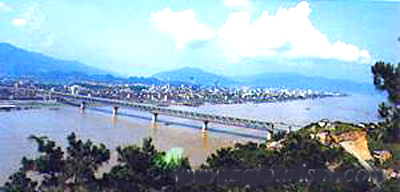| Home / English Column / Environment / Environment -- What's New | Tools: Save | Print | E-mail | Most Read |
| Forestation Proposed to Curb Salt Tide in the South |
| Adjust font size: |
Proposals to build a forest along the upper reaches of Xijiang River to help store rainwater and curb the problem of worsening salt tides in the Pearl River Delta region have been put forward by top political advisers. The region has long been a victim of salt tides as a result of decreasing rainfalls in recent years. The latest salt tide in the region began in mid-February, leading to some parts of the river containing a higher content of chlorine hydronium, the main salt element. The Xijiang River, a tributary of the Pearl River running through the Guangxi Zhuang Autonomous Region, Yunnan and Guizhou provinces in southwest China and Guangdong Province in south China, is most severely hit by salt tides. "A coordinated ecological management should be built by both regions, and Guangdong, located in the lower reaches of Xijiang River, should provide special financing for building of the forest," said Chen Kaizhi, a member of the National Committee of the Chinese People's Political Consultative Conference (CPPCC). He made the proposal with other members from Guizhou, Guangxi and Yunnan to the ongoing fourth session of the 10th CPPCC. The ever-worsening ecological system along the upper reaches of the Xijiang River has resulted in insufficient water flowing into the river's lower reaches during the salt tide period, Chen said. Areas along the river's upper reaches were found to have less coverage of forest, which has worsened soil erosion, according to an investigation conducted by Chen last year. "Rainwater cannot not be effectively stored as a result of the worsening ecological system, thus it is urgent to build a forest that will help store rainwater," Chen said.
Prior to the latest salt tide, the water authority in Guangdong had started water diversion projects from the upper reaches of the Xijiang River to dilute salinity brought about by mid-January's tide. "Water diversion is only a short-term measure to curb salt tides, as it will be forced to stop if there is not sufficient water in the river's upper reaches," Chen said. Chen called for joint efforts by the regions along the Pearl River estuary to build a forest that will help catch and store rainwater. Chen suggested a special financing support system be set up by Guangdong Province to help Guangxi, Yunnan and Guizhou for the project. "Building a forest with financial support from Guangdong will improve the ecological environment along the river's upper reaches and it should become an effective way in the long term to fight against salt tides," Chen said. Guangxi, Yunnan and Guizhou have made efforts for forest projects in the estuary over the last few years, but the coverage of new forest is far from enough to improve the ecological environment. "The limited coverage of forest in the upper reaches of the river results from financial shortages, thus Guangdong should give financial support, as it will also benefit," Chen said. (China Daily March 10, 2006)
|
| Tools: Save | Print | E-mail | Most Read |
 |
| Related Stories |
